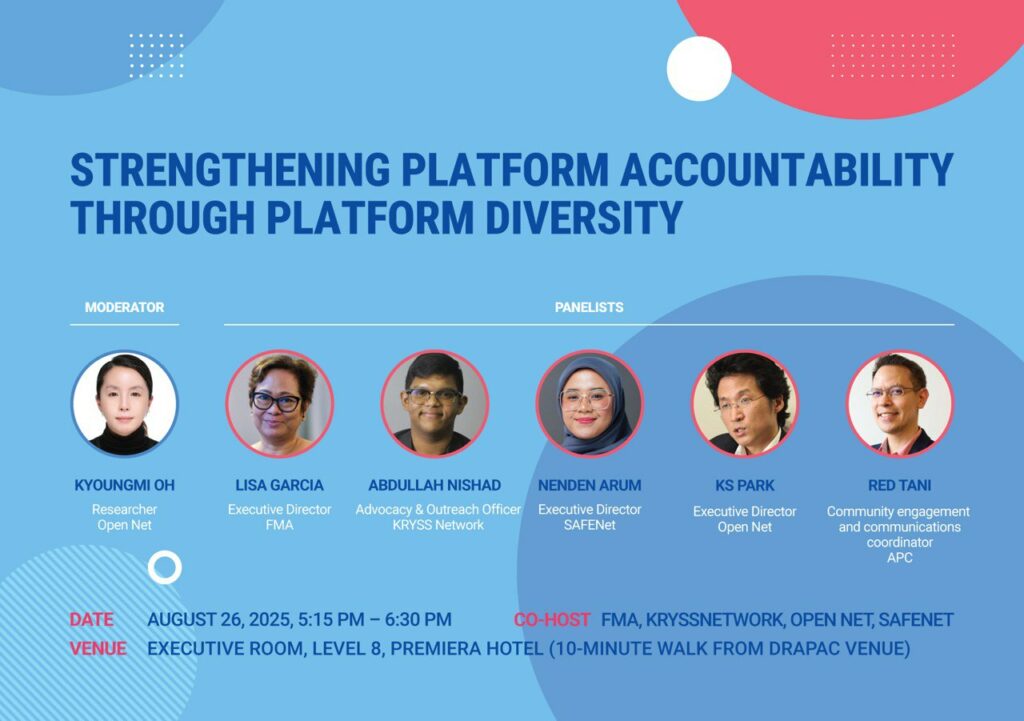
August 26, 2025 | 5:15 – 6:30 PM | Executive Room, Level 8, Premiera Hotel, Kuala Lumpur, Malaysia
Moderator: Kyoungmi (Kimmy) Oh (Researcher, Open Net)
Panelists: Lisa Garcia (FMA), Abdullah Nishad (KRYSS Network), Nenden Arum (SAFENet), KS Park (Open Net), Red Tani (APC)
Co-hosts: FMA, KRYSS Network, Open Net, SAFENet
Session Description:
Big tech platforms dominate our online lives, shaping information flows, amplifying misinformation, and sometimes enabling state censorship. While calls for stronger accountability grow louder, they often come with risks of overregulation and shrinking civic space.
This session introduces platform diversity as a strategy to build resilience and accountability in the digital ecosystem. By supporting alternative platforms and empowering user action, we can push back against monopolistic control and create digital spaces that reflect diverse cultures, values, and communities.
Panelists will explore how civil society can safeguard alternatives, influence platform governance, and envision a more inclusive internet.
Join us to discuss how diverse, user-centered platforms can strengthen digital rights, resist censorship, and counter the harms of concentrated power.
Recap of the Session:
On August 26, 2025, Open Net hosted a forum titled “Strengthening Platform Accountability through Platform Diversity.” The discussion was moderated by Kyoungmi Oh (Open Net, Korea), with panelists Abdulah Nishad (KRYSS Network, Malaysia), Nenden Arum (SAFENet, Indonesia), Red Tani (APC), KS Park (Open Net, Korea), and Lisa Garcia (FMA, Philippines). The session centered on four key themes: online gender-based violence, building alternative platforms, institutionalizing interoperability, and strengthening social and educational foundations.
Abdulah highlighted the problem of disinformation and sexist rhetoric targeting women politicians in Malaysia, noting how such narratives are amplified by social media algorithms. He also explained how “rage baiting” has become embedded in the profit structures of major platforms. Nenden pointed out that while over 70 percent of Indonesians depend on Big Tech platforms, local alternatives have repeatedly failed due to weak technology and inadequate market preparation. Red described how the “Free Facebook” policy in the Philippines has distorted access to information, arguing that Big Tech’s addictive user experience creates a massive gap with open alternatives. KS emphasized that although domestic platforms such as Naver and Kakao remain dominant in Korea, weak antitrust enforcement has allowed both global Big Tech and large Korean corporations to consolidate their market power.
On the issue of alternative platform operations, APC reported that while it uses open-source tools such as OnlyOffice and BigBlueButton internally, external collaboration often reverts to Google Docs and Zoom due to familiarity. SAFENet has introduced tools like CryptPad for security, but found that persuading partner organizations to adopt them is a persistent challenge. In Malaysia, sensitive case files on sexual violence are encrypted and stored in a secure cloud service, yet the convenience of Google Office remains indispensable. These cases underscore the continuing tension between security and usability.
Addressing interoperability, KS introduced it as a way to mitigate network effects, illustrating with a simulation of linking Facebook accounts to alternative platforms. Red warned, however, that interoperability could facilitate even greater data extraction by Big Tech, stressing the need for regulatory safeguards. Nenden cautioned that mandatory interoperability could impose excessive burdens on small startups, while Abdulah suggested it could reduce Big Tech’s data monopoly.
In the discussion on social and educational foundations, the panel agreed on the importance of both digital literacy and civic education. Abdulah emphasized educating users about the risks of data exploitation by Big Tech. Nenden added that citizens must also develop the democratic capacity to recognize and assert their rights, criticizing the fact that government investment remains concentrated in large IT firms. He called for stronger support for local startups and community-driven content ecosystems. Lisa, echoing these points, criticized the “walled garden” structure that traps users within certain platforms. Drawing comparisons with already interoperable technologies like email and web browsers, she argued that platform governance should be user-centered rather than developer-centered. She stressed the need for public campaigns, education, and policy support to ensure that users can exercise real choice.
The final segment addressed legal frameworks. The EU’s DMA and the U.S. Access Act were referenced. KS argued that the DMA’s focus on enumerating prohibited practices limited its antitrust impact. Similar legislative efforts in Korea were found to have little effect, merely shifting fee structures without enhancing market diversity. Consequently, the panel concluded that legal experiments in Asia remain at an early stage, and that social consensus, international cooperation, and context-sensitive institutional design must all be pursued in tandem.
Overall, the session demonstrated that platform diversity must be approached not only as a technical or legal issue but also as a question of education, civic empowerment, and community-based support. All participants stressed that Big Tech’s monopolistic structures disproportionately harm vulnerable groups, and agreed that making alternative platforms viable requires a comprehensive strategy combining digital literacy, civic awareness, public investment, regulation, user-centered design, and community-driven initiatives.


0 Comments